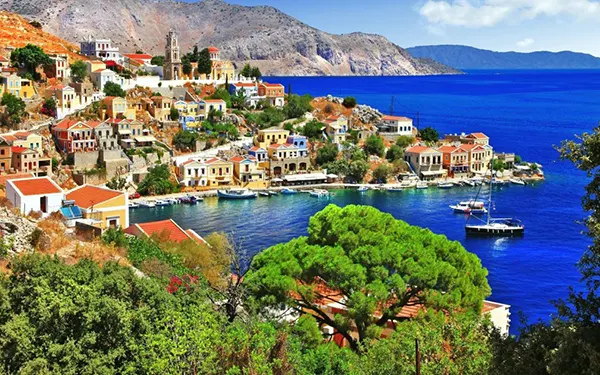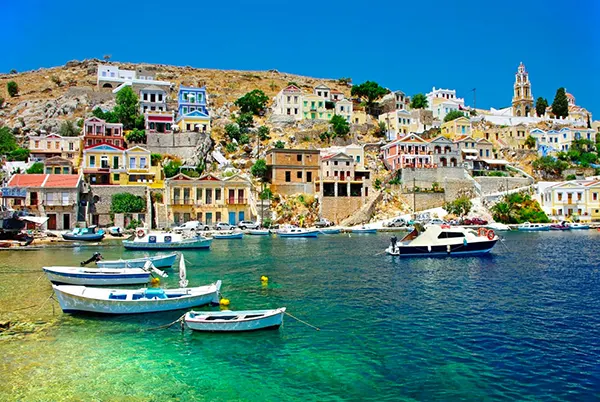
Rhodes (Greece) — The Island of Knights, Sun, and Ancient Heritage
Rhodes, the largest of the Dodecanese islands, is renowned for its blend of ancient heritage, medieval charm, and vibrant seaside life. This sun-drenched island has witnessed the rise and fall of civilisations, leaving behind an extraordinary legacy that continues to shape its identity. Today, Rhodes is a living mosaic where history and modern leisure coexist in harmony, attracting travellers seeking cultural depth alongside coastal relaxation.
The Medieval Soul of Rhodes Old Town
The Old Town of Rhodes is one of the best-preserved medieval settlements in Europe and has been listed as a UNESCO World Heritage Site since 1988. Enclosed by formidable stone walls, the town offers a labyrinth of cobbled streets, Gothic architecture, and centuries-old fortifications that transport visitors to the era of the Knights Hospitaller.
Landmarks such as the Palace of the Grand Master, the Street of the Knights, and Byzantine churches reveal the island’s importance as a crusader stronghold. Every corner tells a story of medieval life, military strategy, and religious devotion that once defined this part of the Mediterranean.
Despite its historical setting, the Old Town remains vibrant with local life, dotted with artisan shops, small museums, and traditional tavernas. This coexistence of everyday activity and medieval surroundings creates a unique atmosphere rarely found elsewhere.
Preservation Efforts and Cultural Significance
Extensive conservation projects ensure the survival of Rhodes’ medieval heritage. Skilled craftsmen and historians work to preserve the authenticity of ancient stonework, fortifications, and historic homes, using traditional techniques wherever possible.
These efforts are supported by educational initiatives that involve the local community, raising awareness about the importance of protecting the island’s unique history. Visitors are encouraged to engage respectfully with the area and understand its cultural weight.
Thanks to these initiatives, the Old Town is more than a tourist attraction — it is a living cultural centre that reflects the resilience and identity of Rhodes across centuries.
Ancient Legacies: Kamiros and Lindos
Rhodes also carries the memory of ancient Greek civilisation through sites like Kamiros and Lindos. Kamiros, founded in the 7th century BCE, was a thriving city with an advanced urban layout, public squares, and an organised water system that showcased the ingenuity of early Greek engineering.
The hillside ruins of Kamiros reveal the remnants of temples, houses, and marketplaces, offering valuable insights into daily life in the archaic period. The peaceful setting overlooking the Aegean Sea adds to its historical significance.
Meanwhile, the acropolis of Lindos stands on a dramatic cliff, where the Temple of Athena Lindia and a Hellenistic stoa overlook the village below. This site highlights Rhodes’ ancient role as both a religious and maritime power in the Aegean.
The Influence of the Knights Hospitaller
Centuries after the classical era, Rhodes became the stronghold of the Knights Hospitaller in the 14th century. They fortified the island extensively to defend against Ottoman attacks, leaving behind castles, towers, and walled settlements across the landscape.
Notable sites include the castles of Monolithos and Kritinia, which still stand on rocky outcrops as reminders of medieval warfare and architecture. Their defensive designs illustrate the strategic importance of Rhodes in the medieval Mediterranean.
The legacy of the knights remains embedded in the island’s cultural identity, merging with its ancient sites to create a uniquely layered historical experience.

Modern Rhodes: Sun, Sea, and Leisure
While deeply rooted in history, Rhodes also thrives as a contemporary resort destination. Its coastline stretches for hundreds of kilometres, offering sandy beaches, crystal-clear waters, and sunny weather for most of the year.
Popular beaches like Tsambika, Faliraki, and Lindos attract visitors seeking relaxation, water sports, and scenic beauty. The western coast is ideal for windsurfing and kitesurfing, while the eastern side offers calm coves and family-friendly shores.
Beyond the beaches, the island’s marina welcomes yachts from across the Mediterranean, while the capital’s nightlife includes vibrant bars, restaurants, and cultural events that showcase local music, food, and traditions.
Tourism Infrastructure and Local Hospitality
Rhodes has developed a robust tourism infrastructure that supports both cultural exploration and leisure activities. High-quality accommodation, efficient transport connections, and diverse dining options make it a comfortable destination for travellers.
Local businesses, often family-run, play a central role in preserving authentic Dodecanese hospitality. Many offer traditional cuisine, handmade crafts, and guided tours that connect visitors to the island’s heritage.
As a result, Rhodes manages to balance modern comforts with cultural authenticity, ensuring that its identity as the Island of Knights and Sun endures well into the future.
